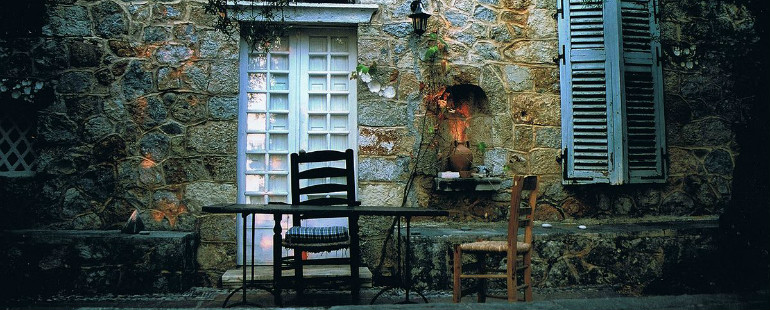The Impact of Expat Writers in Uncertain Times: Patrick Leigh Fermor

The year was 1944. Special Operations Executive officer Patrick “Paddy” Leigh Fermor, having spent a year in Cairo, returned to the occupied island of Crete to kidnap a German general. The Kidnap, or Abduction, of General Kreipe, as the incident would become known, would highlight Leigh Fermor’s mix of charm and autodidactic knowledge. In the morning after the kidnapping, dawn lit up snow-capped Mount Ida. Leigh Fermor heard the general mutter, “Vides ut alta stet nive candidum Soracte . . . ”, To his captive’s amazement, Leigh Fermor continued the recitation. He had memorized the whole of Horace’s Odes more than 10 years before, while walking across Europe on a trip that would set the course of his life.
At 18 years old, Leigh Fermor considered himself a disappointment. The oft-quoted phrase attributed to the headmaster at his last place of education, King’s School, and found in the introduction to the final volume of his trilogy, The Broken Road: From the Iron Gates to Mount Athos, is that he was “a dangerous mixture of sophistication and recklessness.” Having been expelled from school, Leigh Fermor found himself in London where, while trying to study for his diploma equivalent, he quickly fell in with the last of the Bright Young Things. Eventually he tired of the endless partying, as he wanted to be a writer but wrestled with composing anything. Thence he conceived of the walk through Europe, from Holland to Istanbul, that would mark the start of his adult life abroad and eventually lead to his role in the Cretan resistance to German occupation during World War II, and the travelogues for which he became known. He would return to England for brief stints.
Leigh Fermor’s journey, as well as his peripatetic state away from his birth country for most of his life (he spent much of his childhood in India, where his father was an archaeologist), remind me all too much of my own entrance into living abroad and the seeming addiction to being away from the United States that has followed. I first traveled much of Europe, and later went abroad on my own, under much tighter and organized circumstances than those of Leigh Fermor’s vagabond trek. At 15 I spent a week driving around Greece with my mother, meeting family and a land I had never known. Before entering university, I was part of a touring choir. While an undergraduate I studied abroad at Oxford. These pre-adult journeys reinforced my urge to get out. Thus, from the time I left, in 2009, until recently, I was abroad with no strict timeline for return.
After Leigh Fermor’s inaugural journey through Europe, he returned to England in 1937. However what he thought about the country is unclear. King Edward VIII had abdicated the month before, and the Spanish Civil War was the subject of debate in intellectual circles. According to his biographer, Artemis Cooper:
Paddy had been too well inoculated by his years in eastern Europe to trust the Left’s position, which presented the civil war as a definitive choice between good and evil. ‘Are you for or against the legal government of Republican Spain?’ was the challenge. ‘Are you for or against Franco and Facism?’
Cooper reports that Leigh Fermor never engaged in any of these debates, and by spring 1938 he was gone from England again, having made only a small go of it in London. Moreover, he was likely itching to be abroad with his then-lover Princess Balasha Cantacuzene whom he had met in Athens following his great walk. She had gone to England with him, and it was together that they left for Romania.
In last month’s post I wrote about leaving Istanbul. I find myself trying to imagine what Leigh Fermor must have felt upon his return to his home country after knocking about Europe mostly on language skills and charm and borrowed money. I’ve returned to find myself at the end of a presidential election season that has been on par with the oftentimes inconceivability of Turkish politics, and concerns about celebrations for the Muslim holiday Eid al-Adha beginning on September 11. While I now face the earliest stages of reverse culture shock, in the mundane form of restaurants that feel like meat freezers and supermarkets with over a hundred varieties of mustard, I feel what Leigh Fermor must have felt after some time that lead him to leave once again. Perhaps being confined to English and an English way of viewing the world stilted his sense of self. Perhaps he felt overwhelmed by the flash of electric signs and how his mother did not accept his relationship with the much older Princess Balasha. Perhaps, in his own way, he had what we’d now label as reverse culture shock.
There’s much written by expats on their experiences in blogs and even books today, not to mention business-minded studies on that particular tier of expat on assignment for a company. Rarely are those expats as crucial in current events as Leigh Fermor was, due to his unusual background and unorthodox way of doing things.
I myself was not involved in Turkey’s conflicts during my time there, but I witnessed much of what has happened in the last seven years. I’ve encountered several expat journalists and writers who have been deeply involved, going in and out of Syria and the surrounding area. In thinking of their bravery and, at times, recklessness, I think of Patrick Leigh Fermor. After he was demobilized from the army in 1944, he eventually returned to Greece and lived there for many years, forever bound, it would seem, to a country and a people that captured his heart when he was young. I know that those who are doing work like that of Leigh Fermor in the region I’ve left will eventually be remembered as heroes of their time, having played a tremendous role in helping during these conflicts. Like Leigh Fermor, they will be remembered as de facto ambassadors to the region.
Photo: Patrick Leigh Fermor’s desk at his house in Kardamyli, Greece


